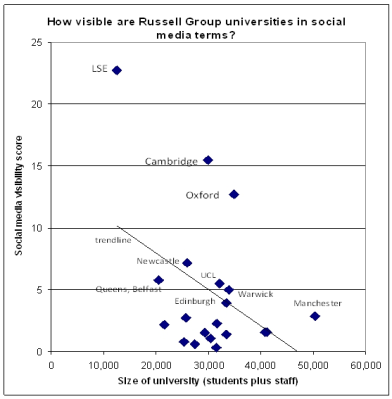A study by Horst Joepen from Searchmetrics has calculated a ‘social media visibility’ score for 20 Russell Group universities. It includes metrics for their presence on Facebook, Twitter, Linked-in, Google+ and other media. The findings are very interesting. They show that size does not really matter than much. In fact, larger universities evidence a difficulty in getting off the ground regarding social media. Or better yet, smaller universities may have an advantage.

The graph above shows a trend that appear counterintuitive. Smaller universities have a higher social media visibility than the larger ones. This is not necessarily about quality; the Russell Group, after all, brings together the UK’s leading universities. It is mostly about a strategic choice to develop and implement digital strategies. Manchester and Warwick are well-known but do not appear to have an important media presence. Cambridge and Oxford, on the other hand, have done a better job at striking a balance. LSE, on the other hand, the smallest in terms of size is by far the most visible online. What is LSE doing?
For one it has developed interesting digital vehicles such as its LSE Politics and Policies blog and the Impact of Social Sciences blog. It has also tackled spaces such as twitter with multiple accounts: Have a look, for example, at the LSE in social media page. Here are some examples of tools or mechanisms that may be relevant for think tanks:
To promote its own research and expertise:
- Africa at LSE – aims to promote African research at LSE. For the purposes of the blog it defines Africa as the African Union does, that is, the continental landmass.
- Greece@LSE – from The Hellenic Observatory, the blog focuses on contemporary Greece and Cyprus.
- International Affairs at LSE – features analysis of contemporary international affairs from experts at LSE and beyond.
- LSE Media Policy Project – aims to ensure policy makers to have timely access to the best policy-relevant research and better access to the views of civil society.
To keep in touch with alumni and its main audiences:
- @lseResearchonline – institutional repository for LSE research outputs; many think tanks will want to advertise work their have produced and stored some time ago and make it available for easy access.
- @lsealumni – LSE Alumni Association; many think tanks often want to let their former staff know about things going on in the organisation
- @LSELibrary – the major international library of the social sciences [also known as The British Library of Political and Economic Science].
- @LSEnews – news and research via the LSE press office; to let people know about events, report launches, etc.
- @LSEpublicevents – news about LSE’s free public lectures: high profile international speakers from government, politics, business, academia and civil society; for public events
- @LSE_Recruitment – news about jobs at LSE; think tanks can let people who are looking for jobs when jobs at their organisations are advertised.
Other:
- LSE channel – videos of LSE public lectures, research, academic interviews – and stories about LSE.
- Facebook LSE page – updates on news and public events.
- Public lectures on LSE on iTunes
In other words, the approach taken by LSE is clearly all-embracing of the opportunities that social media offer. It is not easy to dismiss this effort as it is driven by the content that is produced by its staff and the organisation as a whole.

